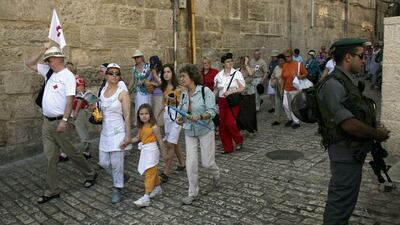At first glance, it looked like a generous promotional stunt by Israel to aid the Palestinians’ struggling tourism industry. Israeli military authorities published this month a video on social media publicising Palestinian attractions in the West Bank.
Most are Christian, including Jesus’s birthplace in Bethlehem – now the Church of the Nativity – and more obscure locations such as the monasteries of Mar Saba and Wadi Qelt, in mountainous desert terrain few pilgrim coaches ever reach.
The video was produced by COGAT, the Israeli military body that rules over Palestinians. It appears to be the latest initiative in defence minister Avigdor Lieberman’s so-called “carrot and stick” policy – a programme that rewards and punishes Palestinians according to their behaviour.
Mr Lieberman has vowed to bypass the Palestinian president Mahmoud Abbas and deal with Palestinians directly. The head of COGAT, Yoav Mordechai, has become a familiar face to ordinary Palestinians.
Last month, in his first live chat in Arabic on COGAT’s Facebook page, he answered questions from Palestinians on how they could receive Israeli work permits or resolve other bureaucratic headaches his officials created for them. Even Palestinians in Gaza defied Hamas to contact him.
The tourism video is similarly designed to reverse the Oslo accords, which held out a false promise two decades ago that the Palestinians would one day enjoy statehood and self-determination. Israel’s micromanagement of the territories is now such that it is even taking responsibility for attracting visitors to Palestine.
Except that is precisely not where COGAT’s video invites them. Instead it beckons tourists to visit “Judea and Samaria”, the Biblical names Israel uses to justify the illegal Jewish settlements that dominate much of the West Bank.
What is going on?
The deception at the campaign’s heart operates on several levels – and reveals much about Israel’s long-term policy towards the Palestinians.
Mr Lieberman wants Palestinians to view Mr Mordechai’s military administration as a benevolent father figure, the address for their problems, rather than Mr Abbas. Who has the power to bring tourists to the territories and boost the Palestinian economy? COGAT, not the Palestinian Authority.
But Israel’s charity comes at a high price: Palestinians must jettison their national ambitions. The tourists can visit but Palestinians must first concede that these are Israeli sites.
A similar message is directed at the tourists. Christian pilgrims with little understanding of the Palestinians’ long history of dispossession are being encouraged to explore Greater Israel oblivious to which side of the Green Line they are on. The distinction between Nazareth and Bethlehem, in Israel and the occupied West Bank, respectively, is increasingly blurred.
Palestinians themselves are all but invisible. The video at no point mentions that they even live in “Judea and Samaria”. It shows buildings, not people.
This rebranding process is already well under way in Jerusalem, which Israel annexed in violation of international law decades ago. Tourism maps are littered with Jewish settler sites, marked as prominently as important holy places such as the Church of the Holy Sepulchre and Al Aqsa mosque. The latter is identified only by Temple Mount.
But in truth the tourism video is even less generous than it appears. Israel controls all entry into the West Bank, meaning that it is impossible for pilgrims to visit without contributing to the Israeli economy.
Israel announced in September a record budget for promoting tourism, a mainstay of its economy. The vast majority of visitors stay in Israeli hotels, are transported in Israeli coaches, eat in Israeli restaurants, visit Israeli gift shops to buy Israeli souvenirs using Israeli money.
In fact, most of the sites visited in the West Bank are controlled by Israel – from the Dead Sea and Hebron’s Ibrahimi Mosque to Herod’s acropolis near Bethlehem and the Baptism site on the River Jordan.
Tourists absorb the Palestinian presence only as a distant menace, highlighted by the bright red traffic signs warning that it is “dangerous to your lives” to stray from major roads. Pilgrims dart into Bethlehem for a brief tour of the Church of the Nativity, passing through a checkpoint in the oppressive, prison-like wall, hinting that Israel has good reason to treat Palestinians like felons.
If COGAT really wanted to change that impression, and help the Palestinian economy, it would encourage tourists to stay in Palestinian cities such as Hebron, Nablus, Ramallah and Jericho. And meet actual Palestinians.
Last week the Israeli parliament passed the first reading of a so-called legalisation bill, which will retroactively authorise the settlers’ theft of land and property privately owned by Palestinians in the West Bank. The legislation extends to the settlers’ criminal acts the same legal protection as the state’s theft of Palestinian land.
The privatisation of the looting of Palestinian territory is intimately connected to the authorities’ latest moves to plunder Palestine’s tourism economy. The overarching goal in both is the “creeping annexation” of the Palestinians’ homeland. Israel is ready to use any and every means at its disposal.
Jonathan Cook is an independent journalist in Nazareth


